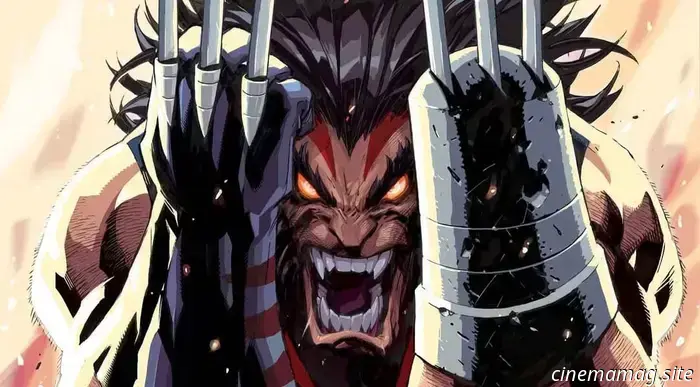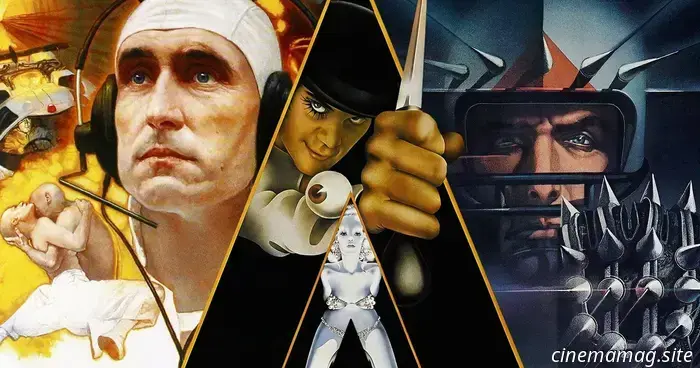
Venice Review: The Last Viking Celebrates Eccentrics, Mads Mikkelsen, and the Beatles
"The world is filled with people," the anonymous narrator of Anders Thomas Jensen's The Last Viking begins, as a hand-drawn animation unfolds a rather unsettling story: once, there was a viking prince who lost his arm in combat; in response, his father, the king, declared that everyone must also lose their right arm. This quirky myth, where disability becomes commonplace, establishes the tone for what is the sixth film directed by the Oscar-nominated Danish screenwriter, hinting at a wholesome progression within his characteristic brand of dark humor. The animation serves as a brief interlude before the scene shifts to the aftermath of a heist thriller, featuring Anker (Nikolaj Lie Kaas) hiding a bag of money in a locker and urging his timid younger brother Manfred (Mads Mikkelsen) to swallow the key. Moments later, police sirens overshadow the terrified cries of their sister Freja (Bodil Jørgensen from The Kingdom: Exodus) amidst the chaos in the siblings' cluttered home.
Fifteen years later, Anker is released from prison and immediately seeks to recover the money; however, Manfred is unhelpful. He has developed a condition that results in amnesia and a split personality, kidnaps every dog he encounters, and insists on being called "John," after John Lennon. Manfred/John is a peculiar character for Mads Mikkelsen to explore, showcasing a side of the actor that is not often visible. He is a bespectacled, middle-aged man who oscillates between being meek and explosive, revealing an unexpectedly childish aspect of Mikkelsen's talent.
Indeed, Jensen has a knack for eliciting these intriguingly gentle performances from the Danish actor, much of which can be attributed to the recurring themes and cast in his works. Mikkelsen, Lie Kaas, and Nicolas Bro (who plays the antagonist seeking vengeance and fortune) continuously adapt their roles with each film, alternating between heroes and villains. Even if one is not acquainted with the universe of Jensen's gentle giants, it’s probable that The Last Viking will resonate emotionally; it intricately weaves unvoiced affection into its comedic scenarios. For instance, the film's midsection veers away from its heist-revenge narrative to gather a group of Danish and Swedish psychiatric patients sharing Manfred's dissociative identity disorder diagnosis, leading them to form a band. Or, to be more precise, to revive the Beatles, although they primarily perform ABBA songs.
As a writer-director, Jensen is attracted to the archetype of the underdog—particularly vulnerable ones—and The Last Viking adheres to this theme. Anker and Manfred represent two parts of the same entity, two fractured individuals whose distinct brokenness seems so mismatched yet somehow complements each other—much like siblings. Through flashbacks, we discover that the boys were raised by an abusive father who made their lives unbearable, with a young Manfred often facing the harshest treatment for wearing viking attire to school. While these elements provide insight into the symbolism behind the title, the viking aspect serves as a unique take on masculinity, a topic Jensen's films have consistently analyzed with humor and sensitivity. In his narratives, strength is a flaw, while vulnerability acts as a shield, rendering The Last Viking a keen exploration of men's mental health—not through portraying struggles, but through an enjoyable blend of genres, meta-textuality, and positive affirmation disguised as a Beatles song.
The Last Viking made its debut at the Venice Film Festival 2025.
Other articles
 Baki returns in a teaser for Netflix's Baki-Dou anime series.
Netflix has unveiled a poster and teaser trailer for Baki-Dou, the newest version of the anime adaptation of the popular manga series Baki, set to debut on the platform in 2026. Take a look at the initial glimpse below… After his iconic battle with his father, Yujiro Hanma, Baki confronts a new danger: the revival of Japan’s most formidable swordsman, […]
Baki returns in a teaser for Netflix's Baki-Dou anime series.
Netflix has unveiled a poster and teaser trailer for Baki-Dou, the newest version of the anime adaptation of the popular manga series Baki, set to debut on the platform in 2026. Take a look at the initial glimpse below… After his iconic battle with his father, Yujiro Hanma, Baki confronts a new danger: the revival of Japan’s most formidable swordsman, […]
 X-Men: Apocalypse Alpha #1 - Comic Book Preview
Marvel Comics has released the official preview of X-Men of Apocalypse Alpha #1 in anticipation of its launch this Wednesday; take a look below… The X-Men of Apocalypse burst into the main Marvel Universe! Set in a bleak future that emerged after the death of Charles Xavier, the AGE OF APOCALYPSE features a conflict-ridden band of X-Men guided by […]
X-Men: Apocalypse Alpha #1 - Comic Book Preview
Marvel Comics has released the official preview of X-Men of Apocalypse Alpha #1 in anticipation of its launch this Wednesday; take a look below… The X-Men of Apocalypse burst into the main Marvel Universe! Set in a bleak future that emerged after the death of Charles Xavier, the AGE OF APOCALYPSE features a conflict-ridden band of X-Men guided by […]
 TIFF Review: Romain Gavras' Sacrifice is a Pop Satire That Misses the Mark
It’s not an exaggeration to claim that the setting in which you view a film significantly influences your feelings about it. This was evident with Sacrifice, a film intended as a satire on the ultra-wealthy and the adoration of celebrities, which took on a different perspective during its gala world premiere at a film festival, attended by numerous prominent figures.
TIFF Review: Romain Gavras' Sacrifice is a Pop Satire That Misses the Mark
It’s not an exaggeration to claim that the setting in which you view a film significantly influences your feelings about it. This was evident with Sacrifice, a film intended as a satire on the ultra-wealthy and the adoration of celebrities, which took on a different perspective during its gala world premiere at a film festival, attended by numerous prominent figures.
-Movie-Review.jpg) Wake Up Dead Man: A Knives Out Mystery (2025) - Film Review
Wake Up Dead Man: A Knives Out Mystery, 2025. Directed by Rian Johnson. Featuring Daniel Craig, Josh O’Connor, Glenn Close, Josh Brolin, Mila Kunis, Jeremy Renner, Kerry Washington, Andrew Scott, Cailee Spaeny, Daryl McCormack, and Thomas Haden Church. SYNOPSIS Benoit Blanc is back to tackle his most perilous case to date. Rian Johnson and Daniel Craig are back for […]
Wake Up Dead Man: A Knives Out Mystery (2025) - Film Review
Wake Up Dead Man: A Knives Out Mystery, 2025. Directed by Rian Johnson. Featuring Daniel Craig, Josh O’Connor, Glenn Close, Josh Brolin, Mila Kunis, Jeremy Renner, Kerry Washington, Andrew Scott, Cailee Spaeny, Daryl McCormack, and Thomas Haden Church. SYNOPSIS Benoit Blanc is back to tackle his most perilous case to date. Rian Johnson and Daniel Craig are back for […]
 Star Trek: Lower Decks #11 - Comic Book Teaser
The crew of the U.S.S. Cerritos is having a fantastic time in 1987 in this week's Star Trek: Lower Decks #11 from IDW Publishing. Below, we have the official preview of the issue for you; take a look… Squeak, squawk, sssskkkaaa, eh, eee. [Translation: Cetacean Ops here! Matt and I have brought the […]
Star Trek: Lower Decks #11 - Comic Book Teaser
The crew of the U.S.S. Cerritos is having a fantastic time in 1987 in this week's Star Trek: Lower Decks #11 from IDW Publishing. Below, we have the official preview of the issue for you; take a look… Squeak, squawk, sssskkkaaa, eh, eee. [Translation: Cetacean Ops here! Matt and I have brought the […]
 7 Remarkable Dystopian Thrillers from the 1970s
Casey Chong journeys back to the 1970s to explore a range of exceptional dystopian thriller films. The 1970s was a period characterized by auteur-centered filmmaking that emphasized creative liberty and witnessed the advent of contemporary blockbusters such as Jaws and Star Wars. This era also marked the rise of films that centered on […]
7 Remarkable Dystopian Thrillers from the 1970s
Casey Chong journeys back to the 1970s to explore a range of exceptional dystopian thriller films. The 1970s was a period characterized by auteur-centered filmmaking that emphasized creative liberty and witnessed the advent of contemporary blockbusters such as Jaws and Star Wars. This era also marked the rise of films that centered on […]
Venice Review: The Last Viking Celebrates Eccentrics, Mads Mikkelsen, and the Beatles
“The world is populated with individuals,” declares the unnamed narrator of Anders Thomas Jensen’s The Last Viking, as an introductory hand-drawn animation unfolds a rather unsettling story: there was a viking prince who lost his arm in a fight; in response, his father, the king, ordered that everyone must also lose their right arm. An unusual myth.
